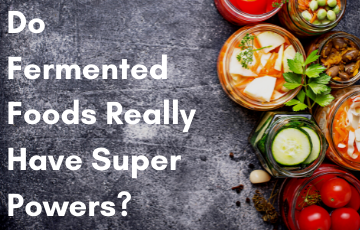
Do Fermented Foods Really Have Super Powers?
At first glance, fermentation may seem like a strange process. However, the use of fermentation dates back to ancient times. Fermenting foods was used so widely that it is difficult to determine which culture even invented it! While fermentation is most used to create alcoholic substances such as beer and wine, botanical agents and plants can be fermented to dramatically increase their bioavailability and nutritional benefits. The metabolic process of fermentation breaks down plant compounds so their full nutritional potential can be released. These fermented compounds offer your gastrointestinal tract maximum absorption and digestion capabilities.
“Fermentation is the pre-digestion of the cellular matrix (see picture below) that releases the beneficial compounds contained within the cell wall of the food,” says Nick Labinsky, COO of Quantum Nutrition Labs. “The release of vitamins, minerals, and phytonutrients enables your body to quickly absorb these beneficial compounds without having to wait for your own body or natural microflora to break them down. As an added benefit, fermentation can also reduce the sugar content of the food and replace it with beneficial enzymes and postbiotics.”

Fermented foods are highly beneficial for the body, increasing the bioavailability of key nutrients and pre-digesting complex foods so that the body can then digest them more efficiently. However, not all plants can be fermented the same way. Fermentation of each plant type must be individually tailored to consider the best procedures for humidity, timing, temperature levels, and the most ideal probiotic culture to use. Customized fermentation procedures are critical in order to create superior nutrient quality and strength. To assure the most amazing absorption of phytonutrients, unique probiotic cultures that are specific to each raw material must be used.
A scientist from the manufacturing company that teams up with Quantum Nutrition Labs had this to say: “Fermentation promotes the growth of good bacteria that are overall beneficial to health. These good bacteria are found in large numbers in the colon where most of our immune functions are carried out. Fermented foods can supply us with nutrients and enhance nutrient bioavailability, support healthy digestion, and preserve the food we eat naturally.”
In addition to the benefits that fermented foods provide, the fermentation process produces additional, newly formed bioactive components known as postbiotics. These components include enzymes, short chain fatty acids, polysaccharides, B-vitamins, organic acids, bacteriocins, and complex molecules that have biologic activity in the gut. Some of these organic acids may also have antimicrobial properties. Others have been shown to support healthy blood sugar levels.
With all of these healthy benefits of fermented products in mind, Quantum Nutrition Labs is proud to offer its own a revolutionary line of fermented products, called “QulturedTM”. These precision fermented formulas are expertly crafted and thoroughly tested by a team of highly trained laboratory scientists in an ultramodern, state-of-the-art laboratory. Our manufacturer’s extensive testing assures that the quality, strength, purity, and composition of our full line of nutritional supplements meets and often exceeds the FDA’s manufacturing requirements. Our formulas use ancient fermentation practices as well as modern science to yield peak nutrition and digestive value – truly the best of the best!
Our newest probiotic fermented powder and capsule products include:
- QulturedTM Fermented Turmeric Blend
- QulturedTM Fermented Greens
- QulturedTM Apple Cider Vinegar Capsules
- QulturedTM Fermented Mushrooms
- QulturedTM Fermented Beets
- QulturedTM B12
Please enjoy adding some of these superb, “QulturedTM” products to your own daily nutritional regimen and experience the “Quantum Nutrition Effect”. Prioritize your own best health with the use of highly bioavailable and easily digested nutrients today!
Resources:
https://eatcultured.com/blogs/our-awesome-blog/fermentation-a-history







